
University of Wisconsin-Madison
UP FOR TIKTOK?
Since 1892 dailycardinal.com
Thursday, March 14, 2024 l






Wisconsin Republican U.S. Senate candidate Eric Hovde has repeatedly accused young people of poor work ethic, drug use and crime, recordings from Hovde’s former speaking engagements show.
Hovde, a multi-millionaire with businesses in Madison and on the West Coast who is challenging incumbent Democratic U.S. Sen. Tammy Baldwin for her seat, writes on his campaign site that “unity and perseverance” can “restore the American Dream.” Recent Hovde tweets echo this sentiment and called on Wisconsinites to rally behind his campaign.
“The worst problem facing our nation is the division. We are ripping apart our friendships and our families over politics,” Hovde posted on Feb. 23. “I’m in this fight to usher in a new brand of leadership and end politics as usual.”
But that messaging is a sharp departure from previous remarks Hovde delivered at GOP events and banking forums in recent years. During a 2017 talk at the Jefferson County Republican Party’s “Pints and Politics” event, Hovde firmly criticized school boards, universities and immigration approaches in Wisconsin, blaming some of the policy on Baldwin’s victory.
He specifically targeted the
Madison school system as a “train wreck” and said creating gender-neutral bathrooms is “nuts.”
“We got to such an absurd level at the end of Obama’s presidency that the big issue was transsexual bathrooms, what?” he said. “You are talking less than .4% of the public, and you’re talking about forcing every municipality and school district to create a unisex bathroom.”
While approximately 1.6 million people ages 13 and older — 0.6% of the population — identify as transgender in the United States, Wisconsin has seen numerous bills that would restrict gender-affirming care for minors and prohibit transgender students from participating in sports.
In the same talk, Hovde said “criminal, illegal aliens in our country” should be deported.
“I mean, I’m in agreement with illegal immigrants being here but criminal ones? How can you even debate that? How could anybody say ‘no, we’re gonna fight to protect rapists, murderers [and] thieves,’” he said.
Minutes later, he labeled college students who protested as “so stupid” and said students cannot respectfully debate on college campuses anymore.
“They’re so stupid they don’t even understand they’re behaving exactly — ‘we’re stopping you because you’ll create violence.’ Wait, so you’re creating violence because you think what I say may create violence?” Hovde

said. “And then they say we’re fascists? Wait, you’re doing exactly what fascists did.”
Hovde again criticized young people in 2021 remarks at a Sunwest Bank Economic Forum held at Newport Beach, California. Hovde is chairman and CEO of Sunwest Bank.
He said young people are not as incorporated into the labor force as people in the Baby Boomer generation as a result of drug use and poor work ethic.
“There’s something going on with our younger people not entering into the labor force, but they have in the past. I fear part of it could be the big chronic drug problem that our coun-
try has had with opiates,” Hovde said. “I think part of it is kids haven’t been taught the same work ethic that the Baby Boom generation has.”
The opioid epidemic is not new. In a May 2021 study, the National Library of Medicine found the opioid epidemic emerged between 1945 and 1960. Researchers wrote the epidemic’s genesis can be traced to Baby Boom generational factors such as a culture of drug experimentation, increased cigarette smoking and the Vietnam War.
The COVID-19 pandemic exasperated opioid overdose deaths by 41% and another 18% in 2021, according to the National Safety Council. The 35-
to 44-year age group experienced the most opioid overdose deaths between 2019-2020, with few deaths related to children younger than 15.
At the 2023 Sunwest Bank Economic Forum, Hovde criticized young people for being “less productive” and “less resilient” than the generations before them.
“There’s some wonderful, strong young people out there, don’t get me wrong. But as a whole, how could 77% not qualify for military service?” Hovde said. “What made them less productive? What made them less resilient, less grit?”
The 2020 Pentagon study Hovde cited found that 77% of Americans ages 17 to 24 do not qualify for military service due to drug abuse, mental health or obesity. The study also found that 44% of those disqualified for more than one reason.
Hovde also said everyone in his generation had jobs, saying cell phones and social media have had negative effects on the current workforce.
“It’s this damn device that has been so corrosive and social media… I mean, you see it, I have a buddy who is a big developer, and every time you watch the construction site, he says, ‘it drives me nuts. Because I see good people, instead of hammering nails and building, they’re sitting there looking at their phones,’” Hovde said. Hovde did not respond to a request for comment.
Mira Vassallo just wanted a pair of basketball tickets. But after missing out on season tickets, which sold out within 11 minutes after going on sale at 7:30 a.m. on a Wednesday, Vassalo was forced to find another way to secure student section tickets.
UW Athletics does not offer a third-party service for securely selling student tickets. So when Vassallo needed to find tickets for the game, she checked social media.
“I couldn’t find anything on the [University of Wisconsin-Madison] Snapchat stories,” Vassallo said. “So I went to Facebook.”
A top-ten team coming to the Kohl Center is a hot commodity. And without a licensed system to buy tickets, it was nearly impossible to find tickets to see a Wisconsin Badgers men’s basketball team fresh off throttling Arkansas State in its season opener, she said.
But Vassalo was hopeful after stumbling on a Facebook post selling student tickets for the game.
“I sent him the money to buy the tickets, and then he was like, ‘It’s not letting me send the tickets
unless I pay this processing fee, can you pay me extra?’” she said. “That’s never happened to me before. I was tired and stressed, so I was like, ‘Okay, whatever.’”
When the scammer asked for more money for a processing fee on the second ticket, Vassallo said she thought it seemed “a bit weird.” That’s when the scammer began to get aggressive.
“He said, ‘It wouldn’t be weird if you just did what I asked,’ and [he] started to get weird,” Vassallo said. “I didn’t really know what to do. I sent it because I wanted to get it over with.”
When Vassallo asked for a refund, she said knew she wasn’t going to get one, but the scammer remained aggressive until he stopped responding. Just like that, she was out $80.
Vassallo said the scammer sent her what she thought was a picture of his Wiscard when they started chatting, but she later found out his name was not in the student directory.
“I was in class trying to do this, and then it just all hit me,” she said. “I went to the bathroom and cried.”
Getting scammed while buying Badger tickets is nothing new. Ticket scams have been mentioned as early
as a June 2017 post in the UW-Madison Reddit community and have been a recurring topic of conversation since.
A 2019 post detailed a person who lost $150 through a Facebook group.
“The [seller] didn’t show up in-person. My friend has called the bank and tried to cancel the transaction since it hasn’t shown up on her account. Right now, they are hoping to get their money back,” the post read. “I feel bad for them. They were so excited about the game; it would’ve been their first.”
Other posts — some as recent as Oct. 2023 — mentioned wariness about purchasing tickets through Facebook.
UW Athletics told the Daily Cardinal it is “continually evaluating ways to optimize our procedures and assist our students in the ticketing process.”
“UW Athletics advises all of our patrons to purchase tickets only through trusted parties,” they said.
“In the case of students, we recommend only buying from someone you know and trust.”
UW Athletics said it has assurances in place to make sure ticket holders have a “smooth ticketing experience” at games but acknowledged

ticket fraud happens. “Unfortunately, third-party transactions — outside of SeatGeek, our preferred partner — are beyond our control.”
But websites like SeatGeek do not offer a platform to resell student section tickets, often including hidden fees that can add a significant amount to the original price.
Without an officially licensed student tickets reselling plat -
form, Vassallo ended up using the UW-Madison Snapchat story to buy the ticket. She wouldn’t recommend using Facebook to buy tickets.
“People shouldn’t be allowed to try and sell tickets on Facebook because it’s so unreliable. I tried to report the guy on Facebook and they didn’t do anything,” Vassallo said. “People get scammed so much.”

Phillips Hall residents report major construction disruptions, including noise and poor air quality.
By Mary Bosch & Elijah Pines PHOTO EDITOR & STAFF WRITERPhillips Hall residents said recent renovations, which began over winter break and will continue through the academic year, have caused disruptions to their physical and mental health.
The residence hall is currently undergoing renovations to improve its common spaces and resident rooms on the first and second floors. Since construction began in January, several residents said construction is more disruptive than communicated by University Housing.
Workers are not supposed to use noise-intensive machinery before 9:00 a.m., and barriers are supposed to be put in place to prevent air transferring between construction and resident spaces, according to University Housing.
Phillips Hall residents said these guidelines are not being followed and have reported a variety of issues, including poor air quality and loud noise at early hours.
Despite Phillips being set to house no residents over break, Arcadia, a Phillips Hall resident whose pronouns are it/its, was moved back into the dorms on Jan. 16, nine days before the academic semester began.
Loud construction started as early as 6 a.m., Arcadia said. When Arcadia called University Housing to try and report construction disruptions, it said University Housing hung up because the noise was too loud.
“I would try to make calls to housing and what not, like ‘Hey, what the f–k is going on?’” Arcadia said.
When Arcadia voiced concerns about loud construction starting as early as 6:00 a.m., it said University Housing talked to the city about contractors breaking the city ordinance to start construction at 7:00 a.m.
The city deflected to the university before University Housing said it was a contractor issue.
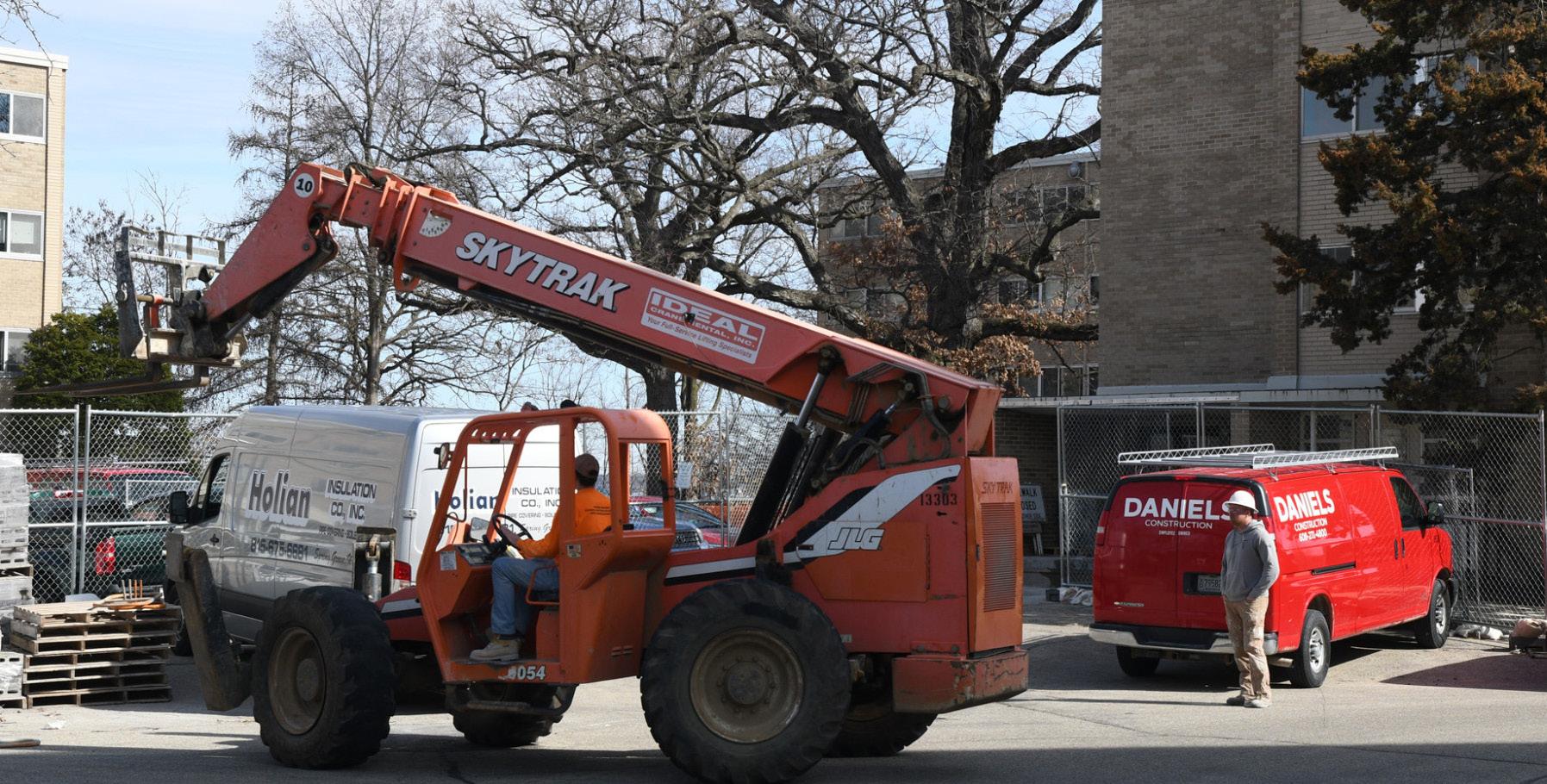
also complained about early morning noise. She compared it to “one of those massage [guns] with the ball on the end pounding into the ceiling.”
University Housing spokesperson Brendon Dybdahl told The Daily Cardinal that residents should “speak to any of the Housing staff in their building, including their House Fellow or any Residence Life or Facilities team members,” to report any concerns related to the construction. Residents can also go to their housing desk, contact their residence life desk, scan the QR code on their door or contact housing’s facilities or desk services, Dybdahl added.
Still, some students said they feel these options are inadequate, and others said they were unaware of the proper channels for voicing their concerns.
“[Our housefellow] can only really communicate when they’re in a board meeting,” Heubner said. “It’s like a four-step program to get there in the first place.”
Renovations affecting health, residents say
After returning to Phillips Hall on Jan. 19, Arcadia said it walked into its dorm to find the fridge and microwave moved, as well as a vent open with exposed fiberglass. Arcadia
said the vent connected to the second floor, which is currently under heavy construction.
“I wasn’t informed of this at all. It sent me into a paranoid spiral — someone was in my room, why the fuck was there someone in my room?” Arcadia said.
The construction crew later sent an email asking if they could put the vent cover back on, Arcadia said. However, Dybdall said staff knocked on the door, and entered when they heard no response. After finding the resident inside, they apologized and followed up to schedule a better time for this work.
Ava Hayes, another Phillips Hall resident, said her bathroom water was turned off from 9 a.m. to 3 p.m. with only 24 hours notice from a slip of paper taped to her door.
Other residents said they’ve had difficulty breathing since renovations began. Phillips Hall resident Thomas Parker, an avid biker, said he has experienced chest pain since construction started.
“It’s been a month and a half since I started biking again. I’ve noticed some weird extra lung thing when I bike [uphill],” Parker said. “Especially with the fumes and stuff on the basement and first floor, I feel like it’s almost impossible to keep air quality good.”
Additionally, with crews
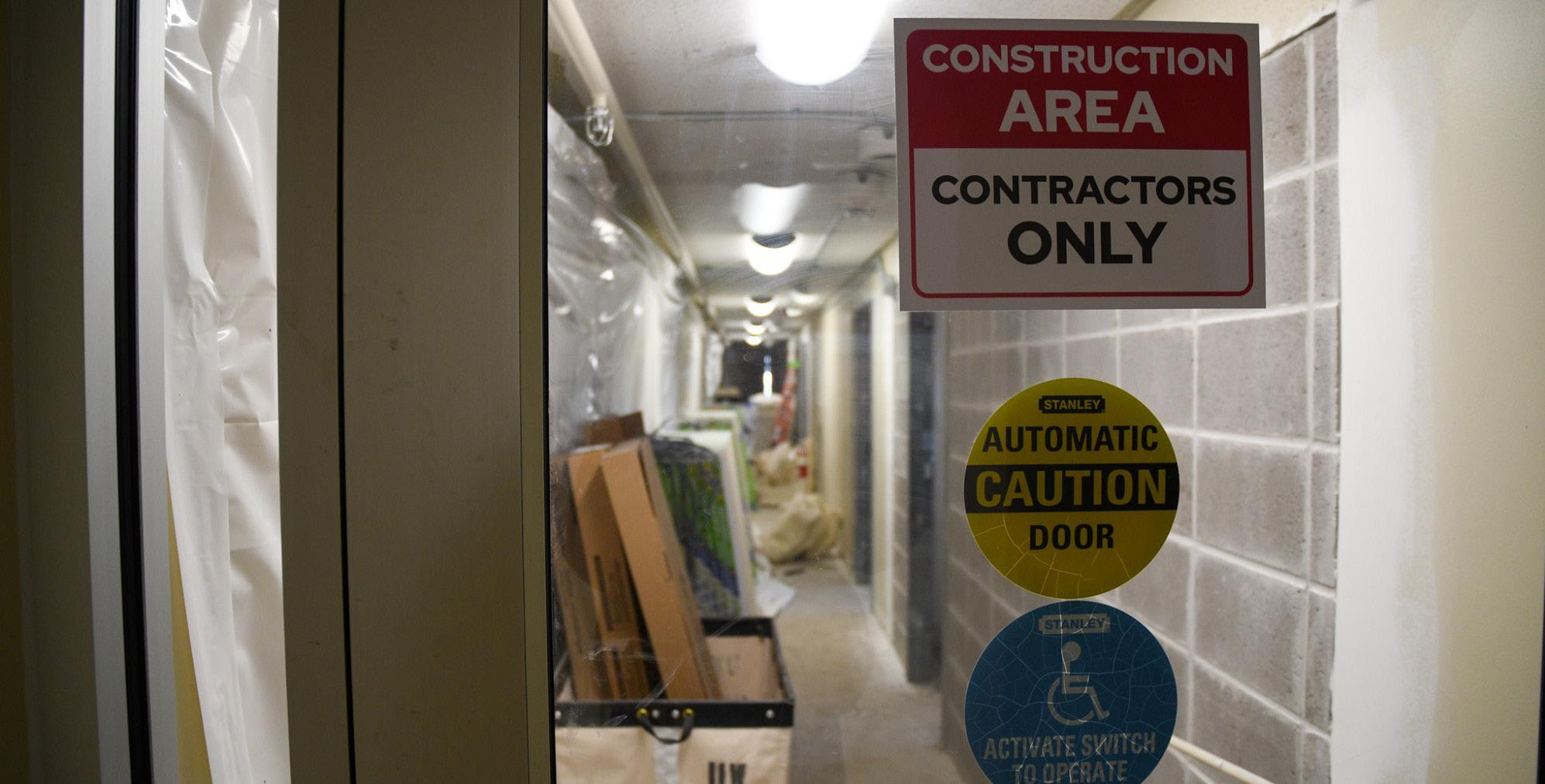
starting work in the early morning, residents said they’ve had trouble sleeping.
“I’m a heavy sleeper, and construction noises have woken me up,” Huebner said.
Residents received a $250 refund on their spring semester housing bill, still making Phillip’s cheapest room the 44th most expensive on campus.
Largest common space in the hall to close
The Phillips Hall basement, the building’s largest common area, will be closed due to renovations from March 11 to April 1, according to an email sent to residents. The first and second floor common areas are also closed.
Even before the basement closed, Huebner said dust covered most of the surfaces where residents eat, and debris was everywhere. Drywall, rebar and even bits of copper piping scattered the area.
Phillips is home to the Open House Community for LGBTQ+ students on the third floor. Due to the closures, residents said they’ve used the third- and fourth-floor common areas. The Open House learning community now shares more of their space on the third floor.
Additionally, the residence hall is located on the outer edges of campus. The nearest library, Steenbock, is an 8-minute walk and isn’t open 24 hours like other campus libraries. Residents said they have to walk half a mile to study somewhere free from loud power tools and poor air quality.
University Housing communicated that only quiet work will be permitted during finals week. But several residents said they are worried this will not be the case.
“Because of all the broken promises and inconsistencies… we’re concerned that the contractors will just continue doing loud work, especially during finals. We have no avenue to communicate with housing,” Parker said.
Resident Charlie HuebnerMeghan Duggan, an American former Olympic ice hockey athlete and University of WisconsinMadison alumna, will address graduates at the spring 2024 commencement in May.
Duggan attended UW-Madison from 2006 to 2011, where she played for the women’s hockey team, skating in four NCAA championship games and winning three. During her senior year in 2011, she was the recipient of the Patty Kazmaier Award, which honors the best women’s ice hockey player in the country.
“Meghan Duggan’s career, on and off the ice, is truly exceptional and inspiring,” UW-Madison
Chancellor Jennifer L. Mnookin said in a Wednesday afternoon press release. “Meghan is a born leader whose strength of character, remarkable achievements, and Badger spirit make her a terrific choice to give the charge to the Class of 2024. I’m excited to hear her remarks to our graduates.”
When she graduated from UW-Madison with a bachelor of science degree in biology, Duggan was the number one scorer in program history, according to the release.
D uggan represented the U.S. at three Olympic Winter Games, played in eight International Ice Hockey Federation Women’s World Championships and participated in numerous other interna-

tional events, including skating in ten Four Nations Cups. She was promoted to director of player development for the New Jersey Devils in 2022. Additionally, Duggan is the president of
Robert
Hawkins,assistant professor in the Department of Psychology at the University of Wisconsin-Madison, often meets with prospective colleagues and graduate students.
He said he is embarrassed to say the university has no paid family or medical leave policy.
“It’s a very awkward, embarrassing conversation to have with job candidates when you’re out for dinner and it comes up that they’ve been thinking about starting a family,” Hawkins said. “I want to recruit the best people here as my colleagues and my students, and it definitely creates a barrier.”
Hawkins and other members of the United Faculty and Academic Staff (UFAS), in collaboration with the Teaching Assistants’ Association, coordinated a letter from department chairs advocating for 12 weeks of paid family and medical leave starting next academic year.
As of Tuesday evening, about 40 department chairs signed the letter, including half of the UW-Madison College of Letters & Science department chairs.
When qualified candidates receive job offers from institutions with family leave policy and UW-Madison, paid family
leave benefits can be a deciding factor, Hawkins said.
“It’s really helpful for the chancellor to hear that this is not just a radical student demand,” Hawkins added. “Paid family and medical leave policy is integral to the functioning of the university and it’s a very, very popular policy.”
In response to the letter, UW-Madison spokesperson John Lucus told The Daily Cardinal in an email Tuesday that Chancellor Jennifer Mnookin is committed to offering paid parental leave.
UW-Madison “continues to work with partners at the state and Universities of Wisconsin” on plans to move paid parental leave forward, Lucas added.
The letter references UW-Madison’s new RISE Initiative, a targeted recruitment campaign that will initially focus on faculty hiring related to artificial intelligence.
“We are writing to you today as department chairs and directors who are tremendously excited about UW-Madison’s continuing growth, and the visionary strategic expansion articulated by the RISE Initiative. At the same time, we are concerned that the lack of a consistent paid family leave policy poses significant challenges
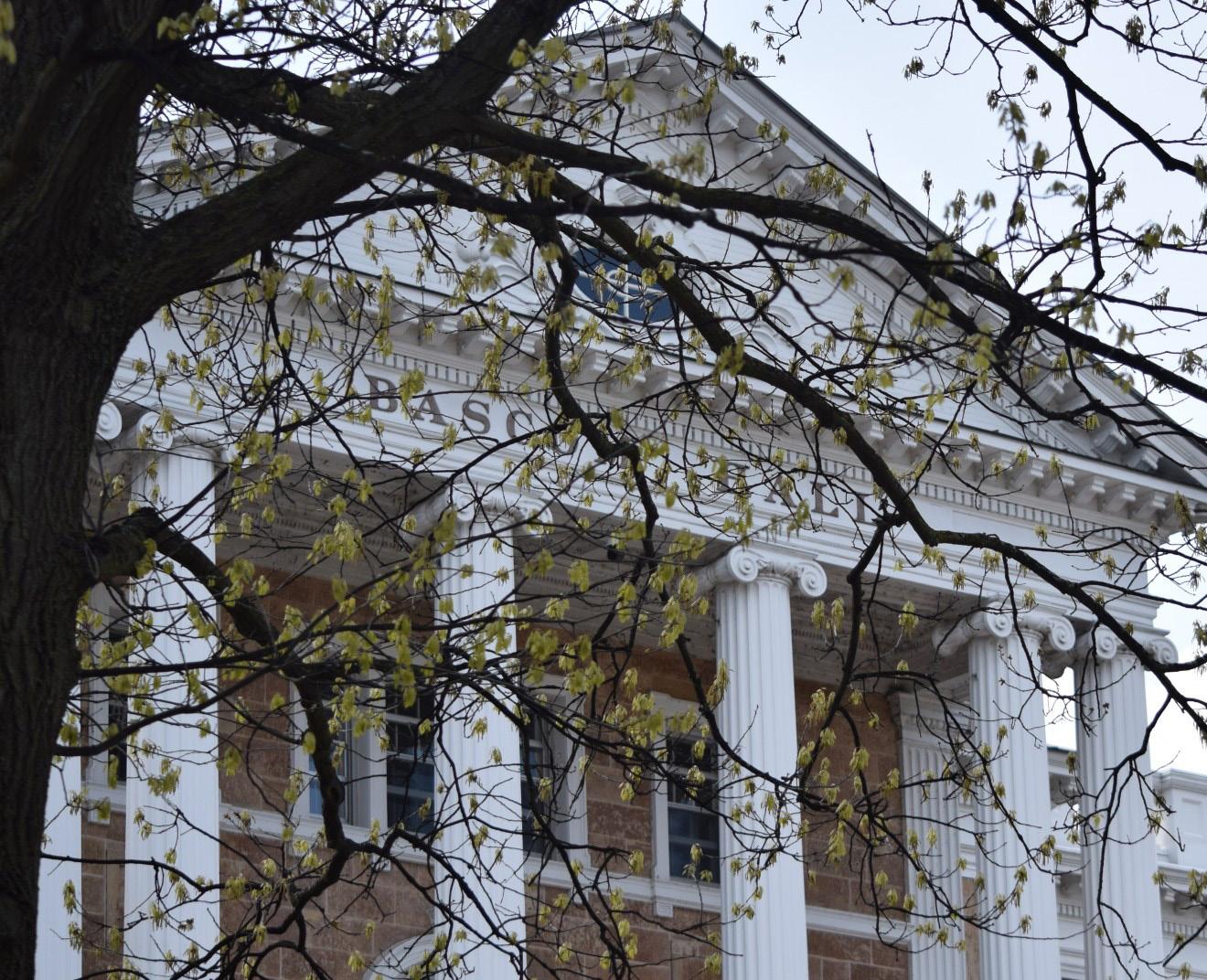
for implementing this vision,” the letter read.
The letter said a lack of paid family and medical leave creates barriers beyond recruitment.
“The financial burdens of caregiving without paid leave disproportionately affect women and people of color, who are more likely to face career setbacks after taking unpaid leave, creating a structural barrier to achieving our equity and inclusion goals,” the letter read.
The letter also referenced other peer universities with paid leave policies. Nine out of ten Association of American Universities Data Exchange peer institutions offer universitywide paid family leave, according to a UW-Madison report on family leave from June 2022.
Workarounds in place of policy
Hawkins said the lack of paid medical and family leave impacted him personally last fall. After he was hit by a car, he first needed to use sick days as he recovered. He was not teaching that semester and only returned virtually through accommodations from his department after several months of treatment.
“It would have been less messy with a clear policy spelled out for what you do in such situations,” Hawkins said.
This is similar to how many faculty and academic staff handle medical and family leave without university policy in place, Hawkins said.
“There are all kinds of workarounds,” he added. “I’ve talked to chairs in some departments where you can teach an eight week course and kind of concentrate your teaching in half of the semester, and take the other half off. Or you can combine your sabbatical with family leave — there’s all these little solutions. But it’s a patchwork of ways of compensating for the lack of a real policy.”
Women’s Sports Foundation and is on the USA Hockey’s Women’s Advisory Committee.
In addition to her skating and coa ching career, Duggan has used her platforms for motivational speaking surrounding leadership, team management, gender equality, LGBTQ+ advocacy and more.
“Even during her college years, Meghan demonstrated exceptional athletic talent, prompting her to temporarily pause her academic pursuits as a junior to join the U.S. National Team,” said Gracie Nelson, UW-Madison senior class office president.
The Spring 2024 commencement ceremony will be at noon on Saturday, May 11 at Camp Randall.
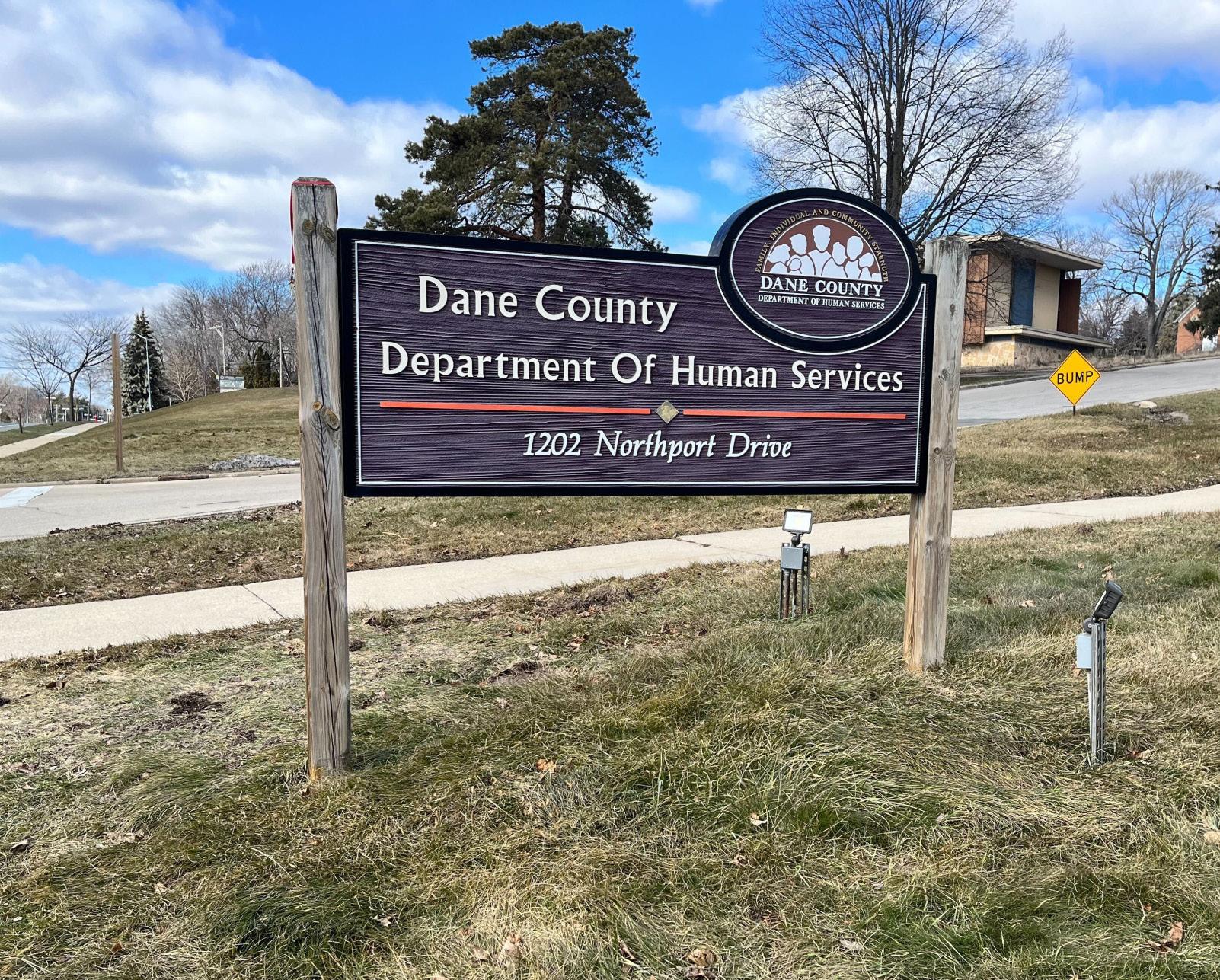 By Bryna Goeking STAFF WRITER
By Bryna Goeking STAFF WRITER
The Dane County Department of Human Services announced a transitional living program earlier this month for young adults who age out of foster care.
According to a March 6 press release, the county’s Adult Transitional Living program aims to prevent youth homelessness of children leaving foster care in partnership with the Madison/ Dane County Youth Homeless Demonstration Project and Urban Triage. The building, located along Roth Street on Madison’s north side, will shelter adults aged 18-21 and provide social services to help its residents find permanent housing, according to the press release. The building will include nine bedrooms, two-and-a-half bathrooms, a full kitchen and living and dining areas.
Dane County Executive Joe Parisi said in a press release that young people deserve “a safe and stable home environment as they make the transition from foster care to the community.”
“This will make a tremendous difference in the lives
of young adults as they learn how to prepare for the workforce, manage finances, connect to stable housing [and] care for their health, all while building a network of support,” Parisi said.
In addition to housing, the building will include an in-house mentor, case manager, housing navigator and peer support specialist to ease the transition from foster care to society.
Staff will provide services including employment readiness, financial literacy, housing navigation, education on healthy relationships and transportation support, according to the press release.
Between one-fourth to one-third of homeless youth and young adults had a history of foster care placement, according to the University of Chicago’s Voices of Youth Count initiative. Roughly 8,000 Wisconsin children are in foster care at any given time, according to the county human services department.
The program aims to move residents to safe, permanent housing within two years of entering transitional housing, according to the press release.
The University of WisconsinMadison officially finished phase one of a campus access security plan in November 2023, moving into a second phase which aims to replace many of the Wiscard-scanning access controls to buildings.
Access control replacement was first floated in 2018, around 15 years after the initial installment. University police requested approval to begin the project in 2019, but it was delayed to 2020 due to COVID19. By June of 2021, police began installation of new software and access controls in residence halls, laboratories and other campus buildings.
UW-Madison Police Department Infrastructure
Security Lieutenant Jeffrey Ellis headed the effort, and his team worked on phase one to install the new software from 2021 to late 2023, according to Ellis.
He said the way the new systems work is essentially the same as the original campus access security. He compared the program change to “going from an Android to an Apple.”
Andover Continuum produced the original access controls, but UW-Madison awarded the new contract project to
Stanley Security, now a part of Securitas Technology, in 2020, according to Ellis.
“The old access control system was built off of a building maintenance or building automation system, and [the new system] was added to that,” Ellis said.
Ellis said the new software is more of a true access control system, and the UWPD crew needed to come up with a hardware solution to exercise control over some of the buildings and doors.
According to Ellis, access controls are nothing new to UW-Madison or other college campuses. UW-Madison first installed access controls during the 2000-01 school year, and many campuses have had them since the late 1990s, according to Ellis.
“[Electronic access controls] were for some of the research labs on campus that had some federal mandates,” Ellis said. “That mandated you had to have electronic access control on [research labs].”
Ellis also said much of the electronic access control was used to document entrances and exits, which were harder to track with keys.
According to Ellis, residence halls were some of the first build-
ings to get access control replacement installed during summer months, when most halls are empty. Even during the semester, students shouldn’t expect to see any difference in the door-scanning system, Ellis said.
“We were able to go into buildings, do the upgrade day-by-day and change out the stuff that we needed to. Most people didn’t even realize,” Ellis said.
Noah Kalthoff, a UW-Madison freshman currently living in University Housing, said the new technology could be more efficient for students who have to scan into their dorms and other campus buildings.
“[It could be] more convenient and more secure,” Kalthoff said.
How is the project being funded?
Much of the funding — around $6.5 million for phase one and almost $19 million for phase two — comes internally from UW-Madison. According to the phase two plan, new access control software will be added to around 50 buildings.
Ellis said there are still buildings on campus without access controls he hopes to get funding for. UW-Madison currently has around 140 buildings with access control.

“You take keys out of the equation, and we’re able to control the locking and unlocking of those buildings,” Ellis said. “That makes it a little bit, in our opinion, more safe for the campus.”
Phase two of the project is also unlikely to impact any University Housing operations or housing residents. University Housing spokesperson Brendon Dybdahl said the updates won’t represent a large change for the residence halls.
For future projects, Ellis said
he and his team are working on making mobile activation an option for access control.
“We are going through an upgrade to all the card readers across campus, and again, most people won’t even realize that it’s going on,” Ellis said. “But what that’ll allow us to do is some mobile credentialing, where instead of having a card, you have to use your phone.”
Phase two of the replacement plan is expected to complete around December 2027, according to the phase two plan.
The University of Wisconsin-Madison and the City of Madison are currently undergoing a series of construction projects to create larger spaces for several programs on and off campus.
Here are five construction projects shaping UW-Madison’s future:
A brand new School of Computer, Data & Information Sciences
Construction of the new UW-Madison School of Computer, Data & Information Sciences building broke ground in April 2023.
The school, a division within the College of Letters & Science, was launched in September 2019. After years of consistent growth in the program, the new building will be located on the corner of Orchard Street and University Avenue and is expected to be completed by 2025.
It will provide a hub for collaboration, combining the programs of computer science, statistics and the Information School, according to UW-Madison.
Protected pathways have replaced sidewalks and some vehicle lanes are blocked during construction. Lori Wilson, marketing and communications director for UW-Madison’s

Division of Facilities Planning & Management, said the pathways are intended to minimize disruption as construction continues.
Irving and Dorothy Levy Hall
UW-Madison is also preparing to construct a new space for the College of Letters & Science.
Levy Hall, the new academic building for the College of Letters & Science, is expected to open in 2026, according to Wilson. The project is named after Irving and Dorothy Levy following a $20 million commitment from the namesake alumni’s sons.
Activity has already started on the site, located on the corner of Park Street and West Johnson
Street. Two UW-Madison living spaces on the site — Susan B. Davis Hall and the Zoe Bayliss Co-op — are slated for demolition in coming weeks.
“The Humanities Building is beyond the end of its useful life,” Wilson said. “It has chronic functional and operational design issues, including an inefficient building design and layout, fundamental design renovation issues, and systems at the end of their useful life.”
When complete, Levy Hall will house African American Studies, Gender and Women’s Studies, History, the Center for Jewish Studies, Religious Studies, American Indian & Indigenous Studies, Asian
American Studies and Chican@ & Latin@ Studies, according to Wilson.
UW-Madison is working to move the School of Education’s Art Department and College of Letters & Science’s School of Music out of the Humanities Building, according to Wilson.
However, the destruction of Mosse Humanities has not yet been approved.
“Future projects need to be submitted as part of UW-Madison’s six-year capital development plan, which must be approved by [the] Universities of Wisconsin Board of Regents and then the State,” Wilson said. “Then, projects must be enumerated by the State Legislature and Governor prior to proceeding.”
There is an increasing demand for admission to the College of Engineering. For school officials, a new building is a top priority to keep up with high demand and allow the school to enroll about 1,000 more undergraduates into engineering programs.
In December, the UW Board of Regents agreed to a deal with the state Legislature to cap DEI positions for three years in exchange for building project funds, including the new engineering building. As part of the agreement, the UW System
committed to restructure a third of existing DEI positions.
Gov. Tony Evers approved $197 million in funding for the engineering building project earlier this month. The new engineering building is expected to cost a total of $347 million and will be a 395,000-square-foot facility, quadruple the current facility’s size.
Lake Street garage demolition, redevelopment
A multi-level parking garage on North Lake Street was closed on Dec. 27, and demolition occurred shortly after.
The site will be redeveloped into a multi-use property featuring an intercity bus terminal, public parking, retail and housing. This project, spearheaded by the City of Madison, is anticipated to be completed by the fall of 2026.
Kronshage, Humphrey, Jorns residence halls renovation
Kronshage, Humphrey and Jorns, three residence halls in the Lakeshore neighborhood, will be undergoing renovations to improve dorm spaces.
New heating systems will be installed and lounges will be renovated and air-conditioned starting in 2027. Additionally, carpeting, doors and lights will be upgraded along with any other necessary improvements.
Wisconsin Badgers women’s hockey beat No. 3 Minnesota and top-ranked Ohio State this past weekend to win its 10th Western Collegiate Hockey Association title in 24 years.
After an overtime triumph against Minnesota on Friday, the Badgers prevailed over No. 1 Ohio State on Saturday to continue their quest for another national championship. Lacey Eden scored the overtime goal against border rivals Minnesota on Friday night to send the Badgers to the WCHA final Saturday afternoon in Minneapolis.
Wisconsin scored early in the first period when Forward Laila Edwards assisted forward Kirsten Simms to give the Badgers a 1-0 lead over the Gophers. Edwards found Simms off a pass, which split two defenders and left Simms with a 1-on-1 with the goalie. From there, Simms had no trouble steering the puck around Minnesota goalie Skylar Vetter.
The Gophers responded with two unanswered goals before the Badgers connected multiple passes in a row around the defense, which led to Simms’ second goal to tie the game 2-2. However, Minnesota snuck the puck past Badgers goalie Ava McNaughton to take the lead again in the beginning of the third period.
Just when a WCHA final seemed out of reach and McNaughton had to leave her net, Badgers forward Casey O’Brien scored with eight seconds left in the game to send it to overtime. Defender Caroline Harvey capitalized on a mishap by the Minnesota defense and left them stunned.
Eden scored on a sneaky back shot
three minutes into overtime, ending the game 4-3 and sending the Badgers to another WCHA final.
Saturday’s final was set for No. 1 Ohio State to play No. 2 Wisconsin. The Badgers and the Buckeyes had faced off in two previous series this season, with the Buckeyes winning three out of four games.
Wisconsin took the lead first when Simms, the WCHA player of the year, took the puck down the rink herself and scored halfway into the first period. Two minutes later, Edwards doubled the lead with a long shot that sailed right past the Buckeye goalie.
Ohio State grabbed one goal back in the beginning of the second period, but the Badgers responded when Edwards capitalized on Wisconsin’s power play and scored another long shot.
Less than two minutes later, Badgers forward O’Brien made it 4-1, slotting the puck right between the goalie’s legs. Big saves from Wisconsin goalie Jane Gervais punctuated the rest of the period, and forward Britta Curl’s individual scoring effort capped it off to extend the Badgers’ lead to 5-1.
Ohio State grabbed two goals back in the third period, but there wasn’t enough time to stop the Badgers from winning the game 6-3 and claiming the program’s 10th WCHA title.
As a result of their success in the WCHA tournament, Wisconsin earned the No. 2 seed in the NCAA Tournament and will host the first round at LaBahn Arena. This is the first time in five years the Badgers will host the tournament at home.
Wisconsin will play the winner of No. 7 St. Lawrence and No. 15 Penn on Saturday, March 16.


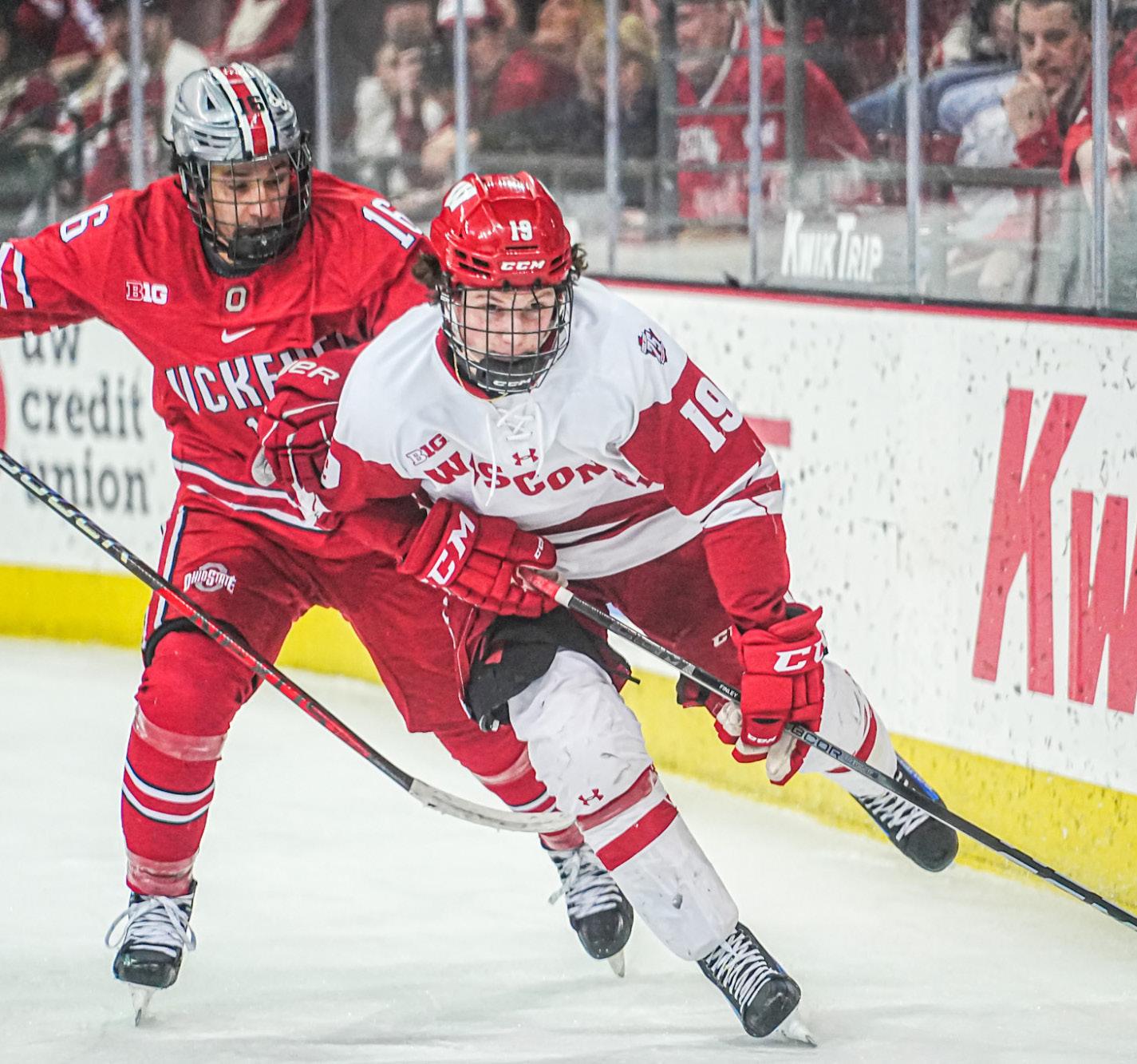
A team of future stars: a dive into some of Wisconsin men’s hockey’s future NHL playersBy Oliver Ehrhardt STAFF WRITER
The Wisconsin Badgers men’s hockey team currently has 12 NHL commits among its 26 rostered players.
Much of the current roster’s success in the Big Ten this season can be attributed to these players. But some of them stand out above the rest — both in stats and playmaking — when evaluating their contributions to the Badgers’ 26-11-2 record.
The freshmen stars
Quinn Finley has made a statement as a freshman. Playing in 35 of 39 total games this season, Finley had 15 points, two of which came from the season opener against Augustana at the Kohl Center in October. Finley joined the Badgers after finishing a dominant season with USHL team Chicago Steel, where he recorded 38 points in 32 games after earning 27 points with his previous USHL team Madison Capitols during the same season.
Finley’s unique size and stature make him a weapon wherever he is on the ice. When Finley gets the puck in the Badgers’ zone, he speeds up the ice with seemingly no effort, stickhandling past defensemen as if it’s second nature. He can read defensemen and sets up plays with ease.
Finley was selected 78th overall in the 2022 NHL draft and will look to continue zooming around the ice with the New York Islanders after his time with the Badgers.
Finley’s classmate and Minnesota native William Whitelaw has also been a consistent threat. Whitelaw is often in the right place at the right time, having two more points than Finley and scoring a crucial shootout goal against Minnesota in February.
Chosen second in the third round of the 2023 NHL Entry Draft, Whitelaw currently leads the Badgers with 121 total shots. With his small and agile build, Whitelaw skirts defensemen for quick shots on net, leading to goals or rebound opportunities. This matches his playstyle from last year on the USHL’s Youngstown Phantoms, dur -
ing which Whitelaw led the team with 237 total shots.
The experienced leaders
Graduate student Owen Lindmark’s dominance will be an irreplaceable trait on the Badgers. Picked in the fifth round of the 2019 NHL Draft, the Florida Panthers hold Lindmark’s rights until the end of this year and will have to get to work in the minors to have an opportunity to earn an entry-level contract (ELC) with the club.
Lindmark managed to score 21 points despite playing in just 27 games this season. His most recent point was assisting the only regulation goal scored in a shootout win against Minnesota in February.
Lindmark’s veteran status and ability to make the most of every game he plays in are crucial qualities for the upcoming NCAA Tournament at the end of March. With Lindmark’s effectiveness and leadership, the Badgers hope to bounce back from unimpressive performances against Ohio State this past weekend.
Sophomore forward Cruz Lucius’s contributions to the Badgers are equally unmatched. Selected 124th overall in the 2022 NHL Draft by the Carolina Hurricanes and recently traded to the Pittsburgh Penguins, Lucius currently leads the Badgers in total points and is tied for 39th nationally in points per game.
Lucius is the ultimate team player. Third on the team in assists, Lucius told Big Ten Network last month his playmaking and “always wanting the puck” on his stick are core tenets of his playstyle.
Lucius always manages to find the open guy and makes the right play in key games. He’s no stranger to playmaking, recently displayed by his leading effort for the U.S. National U17 Team in assists in the 2020-21 season.
These players have cemented themselves as some of the best on a formidable Badgers team, and each and every one of their invaluable qualities will be necessary if Wisconsin hopes to succeed in the postseason later this month.
It has long been claimed that social media is ruining our lives. TikTok is helping to bring this conspiracy to fruition, and the government is taking action.
After several failed attempts, the movement to ban TikTok is back in full force in the form of a bill currently awaiting congressional approval. Upon signing, the controversial bill would give the Chinese company ByteDance six months to relinquish their stock in the app by selling to American owners.
If ByteDance refuses to sell, apps overseen by the company will be banned from all app stores in the United States. In that case, TikTok would disappear.
Users have called their representatives in outrage, urging them not to pass the bill. Nonetheless, the bill passed in the House yesterday morning. If the Senate passes the proposition, President Joe Biden has already announced his plans to sign off on it.
Unrest surrounding the app stems from ongoing tensions between the U.S. and China. For decades, the American government has viewed China as a “grave threat” to democracy and American economic success.
Despite the outward appearance of a fun app that gained its popularity from dances and trends, TikTok has developed an algorithm that learns all it can about users by thoroughly compiling their usage.
Broadly speaking, legislators are more concerned with China’s control over its businesses rather than
with the businesses themselves. The Chinese government holds the power to obtain and use whatever data it wishes from its companies. Due to the amount of U.S. data stored on TikTok, the motion to take action against the app has gained bipartisan support. Many representatives agree: China’s access to American users’ data is a serious threat.
Despite users’ outrage over the possible ban of TikTok, it might be in their best interest for the app to be eliminated. To the individual user, TikTok is detrimental to more than just data security.
The app’s calculated algorithm is designed to encourage users to fall down hours-long rabbit holes of scrolling. It does this by analyzing your behavior and tailoring content to your every interest, making it nearly impossible to become bored. TikTok users who frequently find themselves in this scrolling trap have decreased attention spans and short-term memory issues, according to Medium.
A 2021 Brown University report found the effects of TikTok are addictive — each scroll to a new 15-second video releases dopamine to the brain and possesses users with an urge to keep searching for more.
These attention-grabbing algorithms fry users’ brains so much that they employ TikTok as background noise when completing everyday tasks because the app gives them instant gratification. This constant overstimulation slows down cognitive processing and lowers the ability to focus, according to the Wall Street Journal.
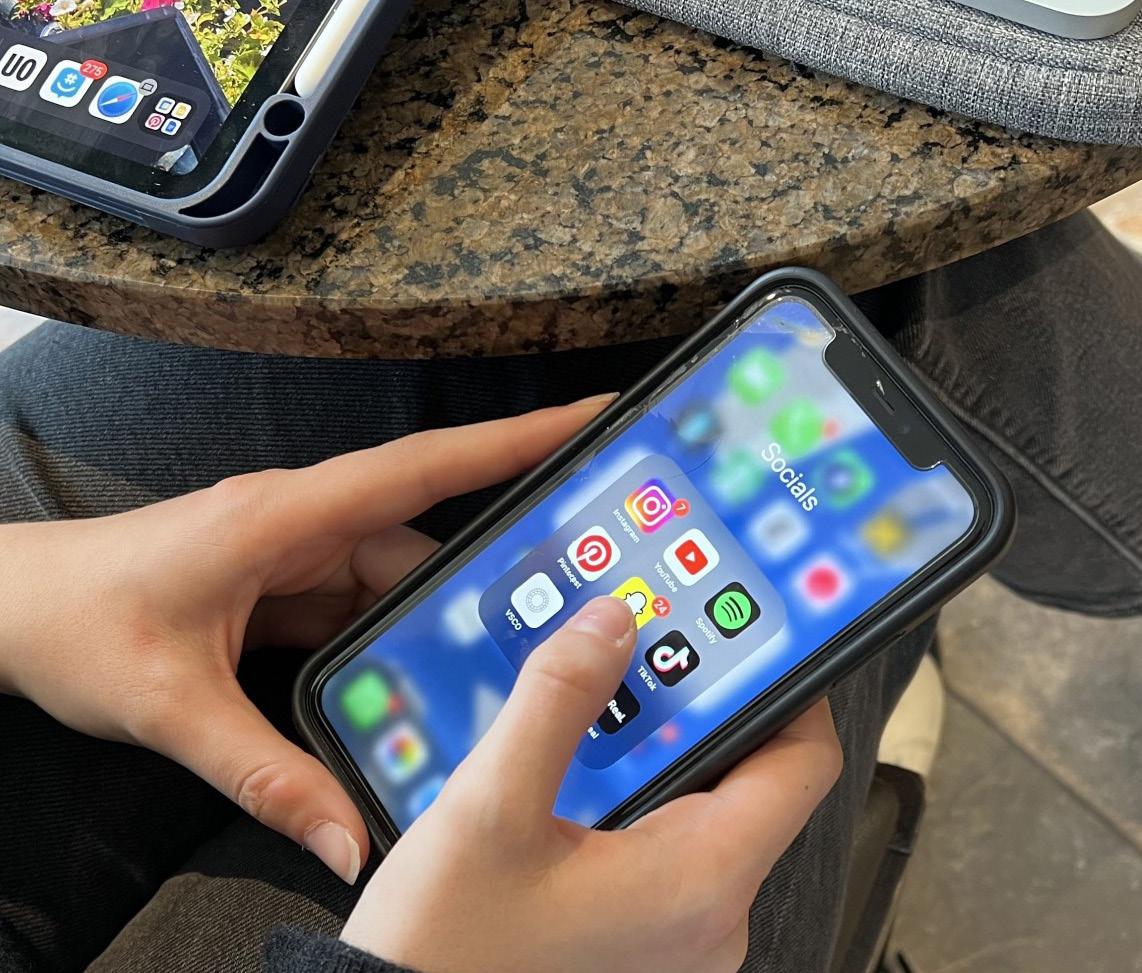
As addictive as the app is, some users have already begun to quit their scrolling cold turkey as the app has become a giant of e-commerce with TikTok shop and instituted efforts to increase digital ad market share. Almost one-third of TikTok videos encourage users to buy something through explicit ads or sponsored posts. The increase in advertisements has frustrated many users, but the company continues to make plans to further the success of their shopping network.
Some people have taken the oversaturation of ads as their sign to leave the app. But for those so riddled with addiction that the ads won’t break their love for the app, this bill might be their only hope. Despite their lack of support for the law, their brains and productivity would benefit from the removal of the 15-second dopamine hits from their everyday routine.
Efforts to reform or remove the app might be a wake-up call from Congress for us to prioritize our mental health.
Going to a big school can be intimidating and lead to difficulty navigating such a foreign space. However, it also offers big opportunities that may not be offered at smaller institutions and pushes students to reach their full potential.
The bustling campus at UW-Madison is invigorating in ways that people don’t always realize. Schools with large student populations offer endless ways to get involved and help individuals find a sense of belonging within a smaller community, even for those who are skeptical.
UW-Madison sophomore Chiara Kenagy said she had some expectations about going to a big school that proved to be untrue when she finally felt like she found her place.
“Even though it is such a big school, it feels pretty small. Things like Greek life and clubs can make you feel like you are part of a smaller community within a large school,” Kenagy said. “I like that I have a lot of different friends, and a lot of them don’t know each other. I am always making new friends because I am constantly meeting new people.”
The transition from attending a small high school to a large university can be daunting. But from game days to big lecture halls, being at a large school like UW-Madison is something people crave.
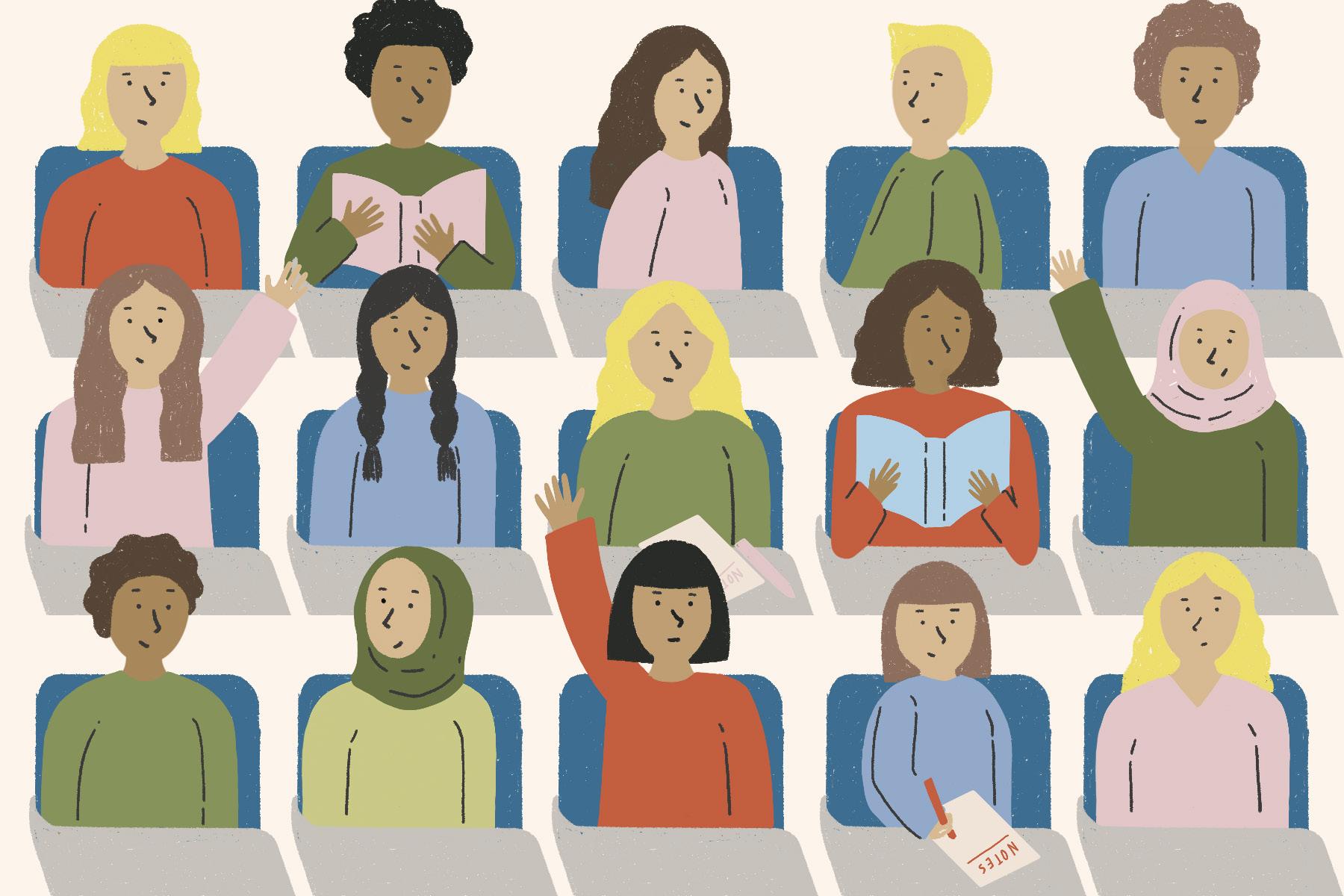
“I don’t really know if I wanted to go to a big school but a push for it was the fact that I went to such a small high school,” Kenagy said. “I also wanted to go somewhere really different from home. Smaller schools reminded me more of high school and felt too comfortable.”
The feeling of being out of place is something most first-year students experience when first attending college. Looking around and seeing what
seems like already-formed friend groups can make individuals feel even more isolated, and trying to find a place to sit in a 400-person lecture hall triggers deep anxiety.
But Kenagy said she overcame these problems.
“Meeting people and feeling overwhelmed by the big school aspects, like how big my classes were and being in huge classrooms was extremely difficult for me. It was hard to get help at
first, but I now realize there are so many resources. You have to make an effort to utilize them,” Kenagy said. “It pushes you to get out of your comfort zone and talk to your professors. Going to the dining hall and having to sometimes sit alone was hard.”
With plenty of trial and error as a first-year student at UW-Madison, students ultimately acquire the tools they need to succeed in the future. Building up the courage to talk to a professor for clarity on something difficult can improve communication skills. Using available resources like academic advisors prepares individuals by pushing them to reach out and schedule appointments to plan their courses for the semester. These are all tools that are very much essential outside of college.
Additionally, attending a large college opens up incredible networking opportunities. UW-Madison has an amazing alumni network, providing funding and connections that can help students find internships or job opportunities or even apply for scholarships and financial aid.
Big schools set students up for success by pushing them to reach out for help. The unfamiliarity of large campuses forces students out of their comfort zones, something essential for growth. UW-Madison has so much to offer, which is why students who attend a large university find success.
From the Golden Globes to the Primetime Emmys to the Academy Awards, this awards season has been marked by memorable and historic moments.
The season kicked off with the Golden Globe Awards on Jan. 7, honoring the best in cinema and television. While the red carpet may have missed the dynamic duo entrance of Kylie Jenner and Timothée Chalamet, fans were thrilled when the two were spotted reuniting inside the venue, sharing a kiss from their seats during the ceremony. Chalamet, nominated for his role in the latest adaption of the beloved Roald Dahl story “Wonka,” showcased his signature style with a sparkly jacket. Jenner complemented his look with a stunning black dress featuring lace and sparkles.
One standout of the evening was the victory of “Oppenheimer,” a compelling drama that won the esteemed title of Best Picture. Directed by filmmaker Christopher Nolan, the film captivated audiences with its meticulous attention to detail and powerful portrayal of the hectic life of J. Robert Oppenheimer, the brilliant physicist behind the development of the atomic bomb during World War II despite challenging circumstances.
Meanwhile, Lily Gladstone made history by becoming the first indigenous actor to win Best Performance by a Female Actor in a Motion Picture –Drama for her role in “Killers of the Flower Moon.” She

delivered a moving speech in the Blackfoot language. Her achievement was long awaited, given the taxing and controversial history of Native American representation in cinema.
Billie Eilish and her brother Finneas O’Connell notably won the award for Best Song in a Motion Picture with “What Was I Made For?” from the film “Barbie.”
Following excitement at the Golden Globes, the 75th annual Primetime Emmy Awards took the stage on Jan. 15 to honor tele-
vision’s admirable achievements.
Quinta Brunson became the first Black woman in over 40 years to win Best Lead Actress in a Comedy Series for “Abbott Elementary,” and Ali Wong became the first Asian actress to win a lead acting Emmy for “Beef.”
RuPaul’s milestone as the most awarded host in Emmys history, with eight consecutive wins, also highlighted the diversity of film talent celebrated on television.
The Emmys came to a close with an emotional tribute.
Charlie Puth, alongside artist duo The War and Treaty, performed the iconic Friends theme song, “I’ll Be There for You” in honor of late actor Matthew Perry.
Finally, the 96th Academy Awards took place on March 10 with comedian Jimmy Kimmel as host. Kimmel kept the crowd entertained, cracking jokes about Ryan Gosling and Margot Robbie winning the genetic lottery and calling out Bradley Cooper for bringing his mom as a date for the
second year in a row.
Robert Downey Jr.’s Best Supporting Actor win for his portrayal of Lewis Strauss in Oppenheimer was a standout moment at the Oscars. Downey expressed gratitude to his wife, crediting her for rescuing him like a pet and nurturing him back to life.
Renowned for her exceptional talent and widespread popularity in the world of cinema, Emma Stone earned the esteemed Best Actress award for her engrossing performance in “Poor Things.”
“Poor Things” follows the story of a young woman named Bella Baxter, played by Stone, who is brought back to life by a mad scientist. Baxter’s resurrection comes with a twist: she is given the appearance of a beautiful woman and a new identity but has no memories of her previous life.
Stone acknowledged the profound impact of teamwork in filmmaking in her acceptance speech. She expressed deep gratitude to her fellow cast members, crew and all those who contributed to the film’s powerful vision of selfdiscovery and liberation.
Finally, Da’Vine Joy Randolph won Best Supporting Actress for her role in “The Holdovers.” She thanked her mother and reflected on her journey to success in an emotional tribute underscoring the power of perseverance and celebrating film’s transformative power.
memory of just sitting and getting lost with a good book,” Hornung said.
Whoknewacarcouldsaveagirl’slife?CardinalwriterAlexandraMalatesta’sMiniCoopersavedherlifeinmorewaysthanone.
By Alexandra Malatesta STAFF WRITERAs a second-year college student at the University of Wisconsin-Madison, I found myself reminiscing about my high school years. Having relocated multiple times, I eventually found a home in the coastal town of La Jolla, California.
Just as I was adjusting to my surroundings, college approached and necessitated yet another move. This transition meant bidding farewell to my comforts —friends, family, my familiar environment and my beloved gray Mini Cooper.
In La Jolla, my distinctive car was a well-known sight, serving as a symbol of my presence wherever it roamed.
My Mini Cooper held sentimental value as my father gifted it to me on my 16th birthday, sacrificing his own car to make it special — a gift every teenage girl dreams of receiving on her birthday.
At that moment, I considered it just a vehicle. But on Sept. 15, 2020, my Mini Cooper revealed its true significance. It was a symbol of miracles. I had been involved in a car accident that left my entire Mini Cooper in shreds. I was the only thing that made it out without a scratch. My car was
more than metal and wheels; it was a guardian angel in disguise. To this day, it remains one of the most terrifying experiences I’ve ever had, and I’m still puzzled by how I managed to emerge unscathed and why fate chose me.
The car turned into a giant bubble that saved my life by sacrificing its own.
Grateful for the car’s role in saving his daughter’s life, my father ensured me he remained loyal to the brand by replacing the now-destroyed car with the same model.
This time, the car had a new purpose: it bore the weight of my survival and became my sanctuary. It provided me with a space to simply be myself. My Mini Cooper remained a constant anchor, offering solace and stability amid moments of turmoil and distress. From iconic car rides with friends and crafting cherished high school memories to being a comforting presence even when tears are running down my face from being heartbroken, this car served as my emotional support system. It brought me home safe, regardless
of the circumstances. It never gave up on me.
High school soon came to an end and I went to college, where I didn’t need my Mini Cooper. Although I don’t use it on a daily basis anymore, it’s always sitting in the same spot, waiting for me to come back.
But when I finally did, my car was different. It was differ-
ent because I had grown, and the car had stayed the same. It represented my old self, but that wasn’t a bad thing. I loved who I was, but I love this new version even more. Whenever I see a Mini Cooper on the street, I smile. I smile because I understand that such a small vehicle holds a lot of power. It has the power
to save you from tragedy, sit there while you cry, hold your secrets, share your favorite meal, listen to your favorite songs, drive you to your graduation and take you to your new awaiting adventures.
Now my Mini Cooper is driven by my dad, who takes it to Los Angeles and back during the week for his job. It watches

Contentwarning:Thisstory contains information about sexual violence
In a sparsely-filled Vilas Hall theater, while my friends were preparing themselves for a night of Wisconsin debauchery, an Indian father in the heart of Jharkhand, India, told me a story.
His nephew was married some months ago in a wedding he worked extensively to prepare. The entire village was there to celebrate with music, sweets and dancing until the wee hours of the night. The man, Ranjit, and his wife and two youngest children left well before midnight, but he let his eldest daughter, Kiran, stay longer just this once.
She returned bleeding and collapsed on their doorstep at 1 a.m.
Three male relatives in their 20s perpetrated the attack, one of them being the cousin in question. They isolated Kiran from her friends as the girls were leaving to return home, dragging her to the bank of a river and beating her once it was all over.
Kiran screamed, but no one heard her.
Nisha Pahuja’s documentary “To Kill a Tiger,” filmed in 2018, follows the family’s legal battle for Kiran’s perpetrators to receive prison sentences in a country where women are raped on an average of once every 15 minutes and a father
standing by his daughter is an extraordinary case.
“The amount of love I gave her, I wasn’t able to give [to] any other child,” Ranjit said. “I think she’s received all my love, and there’s nothing left for anyone else.”
It was Ranjit’s love for Kiran, who insisted she wanted her victimizers punished for their actions, that guided their family through 14 months of a harrowing legal process that caught the attention of Jharkhand’s Srijan Foundation for women and children.
Despite threats from the perpetrators’ families, ostracization from their village and a defective testimony from the investigation’s main police inspector, the family’s battle ended in a landmark verdict sentencing each perpetrator to 25 years of “rigorous imprisonment.”
The documentary builds two hours of stomach-churning sadness into a celebratory climax, where Kiran experiences her first moment of boundless joy in an amusement park with her siblings as her father watches with pride.
“I said I would kill the tiger, and I did,” Ranjit said.
Kiran is currently a successful Class 12 student, studying to become a police officer and help victims of cases like hers. She and her father held a postscreening Q&A in the U.K. last year, according to Pahuja’s interview for the International Documentary Association on Nov. 28, 2023.
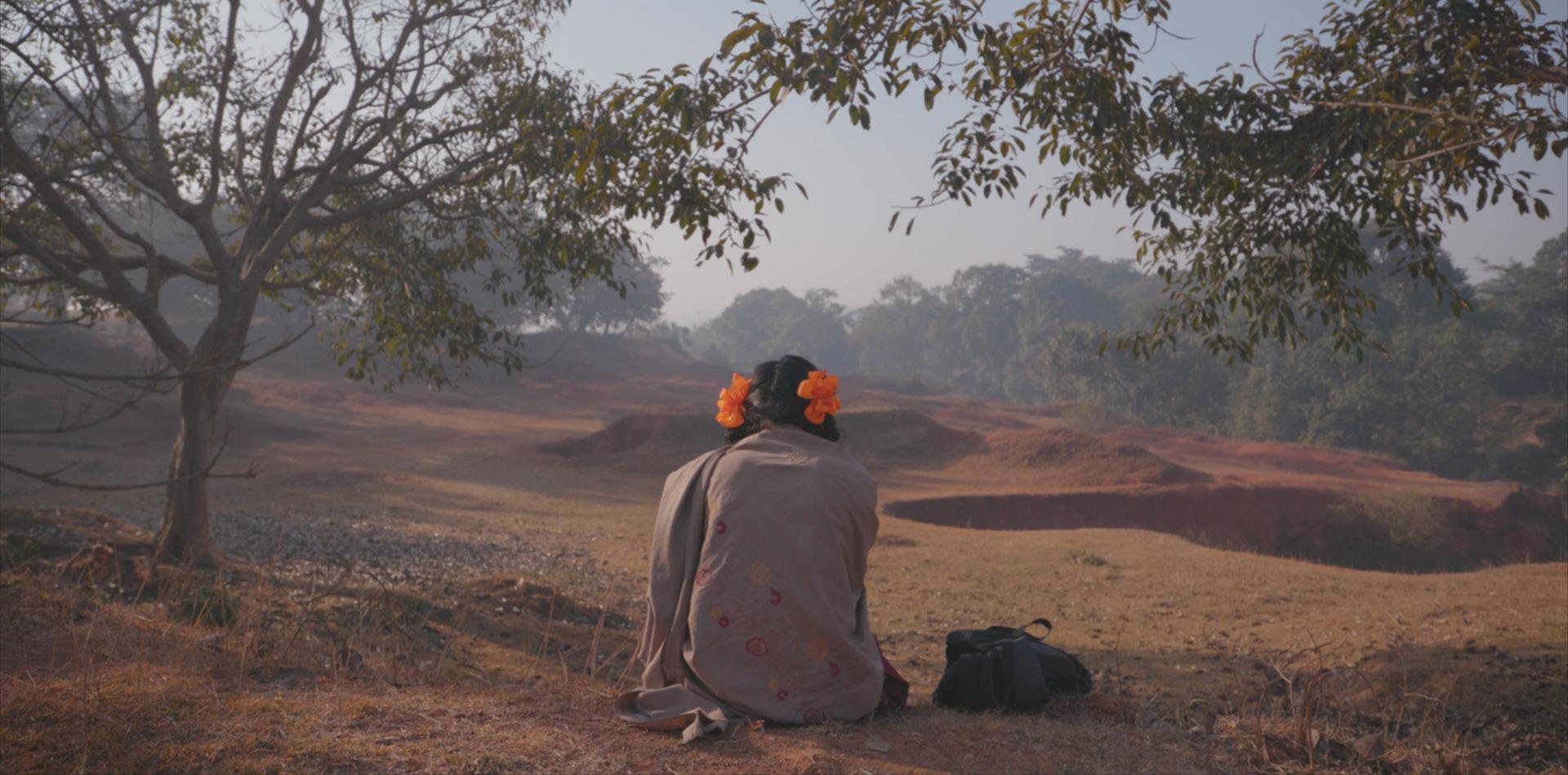
As I watched the movie, I couldn’t help being stuck on the thought that Kiran’s alienation from society would extend beyond what took place during the legal proceeding itself.
In conversation with Kiran’s Srijan Foundation case advocate in the documentary, Ranjit said his daughter remained diligent toward her education during the case.
“If she accomplishes something no one has done before in our village, she’ll have proven herself,” Ranjit said. “If you become something, the stain on you, you can wipe that clean...If you’re educated, you can defend yourself.”
Ranjit’s comment was shut down by the advocate, who rightfully said there was no stain on Kiran and that nothing about the attack stained her. But as an eight-year sur-
New Orleans native Jon Batiste played his heart out to a sold-out crowd at The Sylvee on Feb. 24. Batiste’s constant smiles and gospel shouts made for a truly memorable experience.
Batiste is on tour for his Grammy-nominated album “World Music Radio,” released on Aug. 18. Batiste was nominated for six Grammys, including Song of the Year for his collaboration with Lana Del Rey on “Candy Necklaces.”
The stage setup consisted of studio-like recording equipment and a sky-blue backdrop decorated with a butterfly. The lights dimmed at the start of the show, and the crowd was thrown into a musical plane that instantly transcended reality. Batiste ran onstage playing a purple telecaster and donning a magenta suit after the band jammed for a few minutes.
Batiste and his band opened up with the soul-filled anthem “FREEDOM” from his 2021 Grammy-winning album “We Are.” Batiste easily transitioned between instruments, starting a song on the guitar, playing some notes on a synthesizer midway through and finishing back on the guitar.
A unique change in tone came when Batiste performed his afrobeat-influenced track “Worship” from “World Music Radio.” This is where the production of the show shined through — the audience was hit with a flurry of multicolored lights as the beat started, and people started jumping around and dancing with joy.
Batiste took a much-anticipated seat behind his jet-black Steinway once the band left the stage. He effortlessly improvised while incorporating recognizable musical motifs that led into songs like Scott Joplin’s
“The Entertainer” and “If You’re Happy and You Know It.”
The highlight of the piano set came when Batiste performed the emotional song “Butterfly” from “World Music Radio.”
Batiste wrote “Butterfly” for his wife, Suleika Jaouad, who is battling leukemia. Toward the end of the song, Batiste called for peace and talked about the importance of love in the world.
By the end of the song, some audience members were holding up their arm with their thumb, pointer finger and pinky outstretched to sign ASL for love.
Batiste then walked off stage briefly while his band walked back on. The band jammed while the backup singer introduced each of them. After each respective member did a solo, Batiste emerged wearing a green varsity jacket that had an embroidered “B” on the front while he ferociously played a bright red melodica. The band
vivor of child sexual assault myself, I know exactly what Ranjit was trying to say. Child sex abuse survivors often face extreme psychological isolation from others well into adulthood, exacerbated in situations of indifference or outright blame from their community. To this day, Kiran “never discusses the [sexual assault] incident” with even her father.
Survivors are present in all walks of life, and countless famous, celebrated people across time have flourished beyond their circumstances.
Healing is always possible, and I know Kiran’s remarkable, persistent courage toward her situation — even as the perpetrators appeal their sentences to higher courts — indicates she will only continue climbing to new heights of greatness.
In the week since I watched “To Kill a Tiger,” I have wondered if Kiran finds herself continuously attempting to scrub off that stain. I wonder how she eats and sleeps, if she flinches when touched or has difficulty connecting with others. I wonder if she stays up until the crack of dawn like she did for her court testimony five years ago, hoping to become something that absolves herself from that nightmare.
“I keep thinking, ‘Will I fall in love or not?’” 13-year-old Kiran told Pahuja. “And if I do, how will I tell him what happened to me?”
It is the question many of us ask ourselves, something Pahuja’s documentary helps to answer: how to tell others a story heard a thousand times before.
“To Kill a Tiger” premieres March 10 on Netflix.

jumped directly into the soulfilled song “CRY” while Batiste switched between playing the melodica, piano and saxophone. He is truly a musical marvel and inexplicably versatile on stage.
For the encore, Batiste and his band lined up toward the front of the stage to improvise an acoustic set. Batiste played a melody on the melodica and the rest of the band followed suit. They played a cover of “You Are My Sunshine” followed by a cover of The Fugees’ “Killing Me Softly.”
Batiste and his band walked out into the crowd while jamming. Batiste gave high-fives and hugs while playing his melodica. He then walked upstairs to the balcony of The Sylvee and played to the audience while overlooking the first floor.
This encore was the cherry on top of an already memorable evening. Batiste is a musical genius and truly a generational talent. His sheer happiness paired with his love for all things musical made for a one-of-a-kind experience.